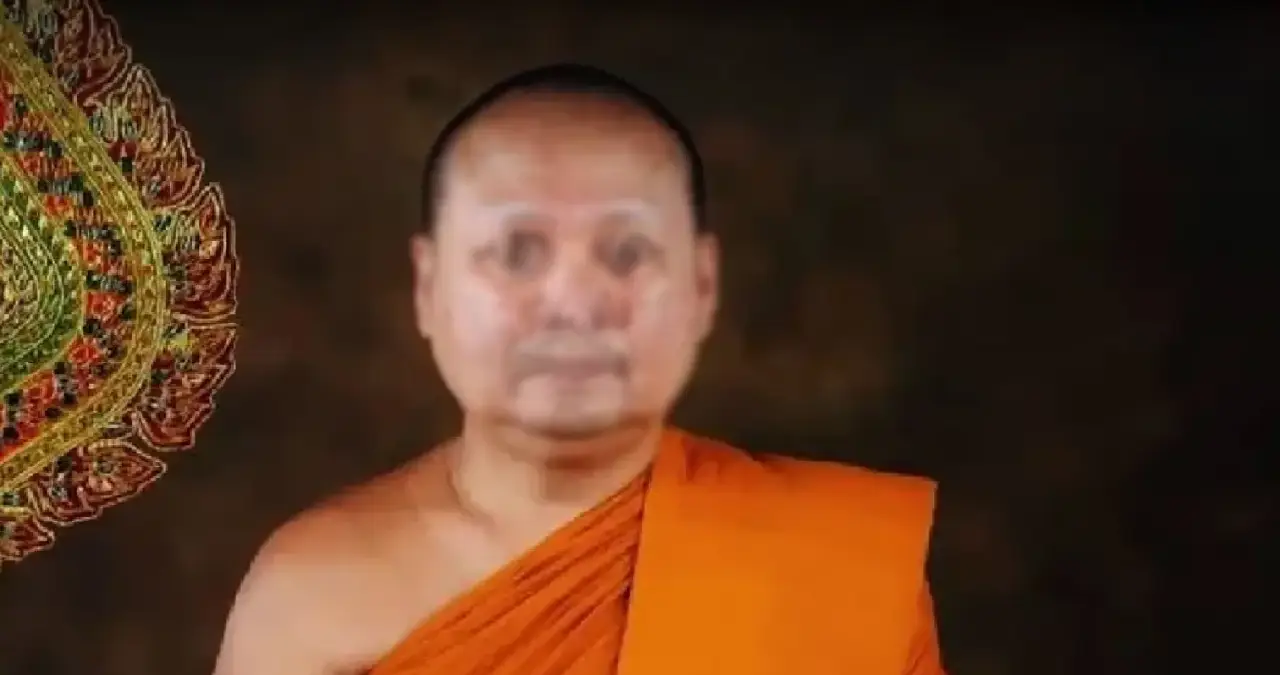In a case that has sent shockwaves through Thailand’s Buddhist community, the Central Investigation Bureau (CIB) announced the arrest of a woman known as Mrs Golf on July 15, 2025, in connection with an extortion scheme targeting prominent monks. The scandal, centered around the former abbot of Wat Tri Thotsathep, Phrathep Wachirapamok—also known as Chaokhun Arj—has exposed financial improprieties and allegations of sexual misconduct, raising serious questions about accountability within the country’s religious institutions. With over 385 million Thai Baht (~US$10.8 million) in transactions uncovered, the case underscores a troubling intersection of faith, power, and exploitation.
A Web of Extortion and Financial Misconduct
The investigation began on June 18, 2025, when Chaokhun Arj reported being extorted. According to Pol Maj Gen Jaroonkiat Pankaew, Deputy Commissioner of the CIB, the former abbot was pressured by Mrs Golf, with whom he had a relationship dating back to May 2024. She allegedly demanded over 7 million Thai Baht (~US$197,000) in child support payments spanning two decades. The situation escalated, leading to Chaokhun Arj’s disappearance and eventual disrobing on June 30, 2025, a move that stunned his followers and raised suspicions of coercion.
Further inquiries revealed a broader network of financial ties between Mrs Golf and multiple monks across various temples. Authorities uncovered evidence of extortion and blackmail through a video clip, which ultimately led to her arrest. Pol Maj Gen Jaroonkiat emphasized during a press conference on July 15 that the operation aimed to protect the integrity of Buddhism rather than tarnish it. He assured the public that legal action would be pursued against all involved parties without exception, signaling a firm stance against misconduct within religious circles.
Financial investigations painted a staggering picture of exploitation. Over the past three years, transactions linked to Mrs Golf totaled 385 million Thai Baht (~US$10.8 million), though only about 8,000 Baht (~US$225) remains in her accounts. Authorities discovered that significant sums were spent on online gambling, with expenditures peaking at 500,000 Baht (~US$14,000) at one point. The Technology Crime Suppression Division (TCSD) continues to probe these digital transactions for further evidence of illicit activity.
Monks Implicated and Institutional Fallout
The scandal has implicated at least 13 monks, nine of whom have already disrobed—a symbolic act of renouncing their monastic vows. Authorities anticipate that more individuals may be drawn into the investigation as evidence mounts. The monks have been categorized into three groups, with the first group prioritized due to clear evidence of financial transactions and sexual misconduct. When confronted with this evidence, many in this group voluntarily disrobed, according to police reports.
One particularly damning revelation involves the former abbot of Wat Chu Chit, who is accused of transferring temple funds into his personal account before funneling them to Mrs Golf. Police are seeking a court order for his arrest on three corruption-related charges, highlighting a breach of trust that strikes at the heart of Buddhist principles. This misuse of sacred funds has fueled public outrage, with many questioning how such activities went undetected for so long.
Adding to the complexity, Pol Maj Gen Prasong Chalermpan, Commander of the Anti-Corruption and Misconduct Division (ACD), disclosed that Mrs Golf has a history of similar offenses in Phichit province. A comparison of past and present evidence revealed a pattern of predatory behavior, with numerous monks having transferred money to her over the years. This recurring conduct suggests a systemic vulnerability within certain religious communities, where personal relationships and financial dealings can be exploited.
Legal Actions and Broader Implications
On July 13, 2025, the former Director of the Phichit Provincial Buddhist Office filed a fraud complaint against Mrs Golf, while the disrobed former assistant abbot of Wat Sothorn lodged a separate complaint with the Anti-Trafficking Division, citing extortion and deprivation of liberty. The investigation team has since compiled substantial evidence, securing an arrest warrant from the Criminal Court on charges of extortion and unlawful detention. Mrs Golf remains in custody under ACD charges, with formal accusations and further investigative steps pending.
The case has also sparked a controversial proposal from a Thai Senate panel, which suggested criminal prosecution for women engaging in sexual relationships with monks. This recommendation, emerging amid the scandal, has ignited debates over gender-specific legislation and the balance between religious sanctity and personal accountability. Critics argue that such measures risk unfairly targeting women while failing to address systemic issues within the monastic order itself.
Cultural and Social Ramifications
Buddhism holds a central place in Thai society, with monks often regarded as moral exemplars and spiritual guides. Temples like Wat Tri Thotsathep are not just places of worship but also community hubs where trust and tradition intertwine. The revelations surrounding Chaokhun Arj and his peers threaten to erode this trust, casting a shadow over the Sangha—the Buddhist monastic community—and its role in public life.
For many Thais, the idea of monks engaging in financial or personal misconduct is deeply unsettling. The act of disrobing, while a personal choice, is often seen as an admission of failure to uphold the strict ethical standards expected of those in saffron robes. The involvement of temple funds in personal transactions further compounds the sense of betrayal, as these resources are typically donated by devotees for spiritual and communal purposes.
Public reaction has been mixed. Some express sympathy for monks who may have been coerced or manipulated, while others demand stricter oversight of religious institutions. Social media platforms in Thailand have seen heated discussions, with users calling for transparency and reform to prevent similar scandals in the future. The case also raises questions about the vulnerability of religious figures to external pressures and the mechanisms in place to protect them—and their communities—from exploitation.
Historical Context and Ongoing Challenges
This is not the first time Thailand’s Buddhist community has faced controversy. Over the past decade, several high-profile cases have exposed corruption, lavish lifestyles, and other improprieties among monks, prompting calls for reform. In 2017, the arrest of a senior monk for money laundering linked to temple funds made international headlines, while in 2018, allegations of sexual misconduct at another prominent temple led to widespread public dismay. Each incident chips away at the sanctity of an institution that millions revere, highlighting the need for systemic change.
The Thai government has periodically attempted to address these issues through the National Office of Buddhism, which oversees monastic affairs. However, enforcement remains inconsistent, and cultural sensitivities often complicate efforts to impose stricter regulations. Monks are traditionally afforded significant autonomy, and any perceived interference by secular authorities can provoke backlash from conservative factions within the Buddhist community.
Moreover, the intersection of religion and law in Thailand is a delicate matter. The country’s legal framework, including provisions under the Sangha Act, governs monastic behavior but often struggles to balance accountability with respect for religious autonomy. The current scandal may serve as a catalyst for revisiting these laws, though any reforms will need to navigate a complex landscape of tradition, faith, and public opinion.
Looking Ahead: Reform or Reckoning?
As the investigation into Mrs Golf and her network unfolds, its implications extend far beyond the individuals involved. The case has exposed fissures within Thailand’s Buddhist institutions, prompting a broader reckoning about the safeguards needed to protect both monks and the public from exploitation. With financial transactions under scrutiny and more arrests potentially on the horizon, authorities face the dual challenge of delivering justice while preserving the cultural reverence for Buddhism.
For now, the Thai public watches closely, grappling with the tension between faith and accountability. Will this scandal lead to meaningful reforms, or will it become another chapter in a recurring cycle of controversy? As legal proceedings advance, the answers to these questions remain uncertain, but the stakes for Thailand’s spiritual and social fabric could not be higher.
















